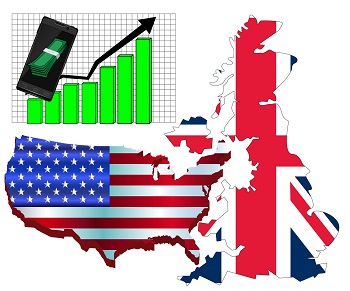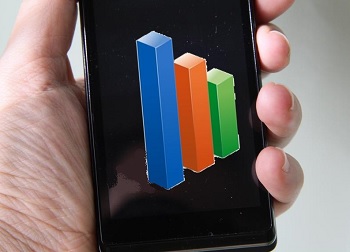While people are using smartphone based wallets more often, it doesn’t appear to be reducing cash use.
According to the most recent digital money index issued by Citigroup in partnership with the Imperial College of London, mobile payments are rapidly becoming more popular in the United States and the United Kingdom, but the least developed countries worldwide aren’t able to use this technology to reduce the use of cash and checks every year.
The hope has been to replace cash and checks with mobile transactions because of the cost reduction.
Transactions in the form of cash and checks cost billions of dollars to maintain every year, which explains why developing nations are placing a considerable focus on mobile payments. The hope is that they will replace a large portion of the use of cash and checks; and the costs associated with those transactions. However, while mobile wallets are becoming increasingly popular in the U.S. and the U.K., they’re not having the desired impact on cash and check use in the developing world.
The report showed that there is a growing gap between the countries that are most and least ready for mobile payments.
 According to Sandeep Dave, the head of global digital strategy at Citigroup, “What we found this year is actually pretty stark.” He explained that “The incipient countries that have a long way to go, they almost showed a zero improvement against 2014 scores [while] the materially ready countries showed the most improvement.”
According to Sandeep Dave, the head of global digital strategy at Citigroup, “What we found this year is actually pretty stark.” He explained that “The incipient countries that have a long way to go, they almost showed a zero improvement against 2014 scores [while] the materially ready countries showed the most improvement.”
At the highest end of the index, Finland has found itself in the top spot for the third year in a row. Singapore is in second place, followed by the United States. The United Kingdom jumped upward in the index by three places in 2015 when compared to its position in 2014. This brought the U.K. to the fourth spot in the most recent index.
Mr. Dave underscored the fact that, as a whole, progress was not rapid in 2015 in terms of the adoption of mobile payments in favor of cash and checks. He stated that the most recent research from the firm indicated that the primary barrier to the use of the digital transactions was consumer attitudes as the tech, market support and digital money products and wallet apps are all essentially available where they need to be.
Predictions with regards to who would win the Spanish, Israeli and U.K. elections were way off.
During the most recent elections in the United Kingdom, Spain and Israel, pollsters called the outcomes quite firmly and yet they were incredibly wrong and the belief is that the same mistakes may be headed to the U.S. due to mobile technology and the lack of understanding of the Millennial lifestyle.
Still, American pollsters are trying their hardest to avoid those mistakes during the 2016 campaign.
According to the president of the American Association for Public Opinion Research, Mollyann Brodie, who is also responsible for overseeing polling at the Kaiser Family Foundation, “There are a lot of people working hard to make sure similar mis-steps don’t happen here.” However, she and other experts in the field – agree that the pollsters across the United States are currently up against some extremely complicated challenges with regards to their methodologies. These challenges are about as tough as they’ve been since mobile technology first hit the mainstream.
Millennials use their mobile technology to screen calls, throwing off the balance of understanding of voters.
 People in the Millennial generation don’t feel the urgency to pick up the phone when it rings, as has been the case in previous generations. When their mobile technology device rings, they use caller-ID to see who is on the other end, and they feel no obligation to pick up when it’s someone they don’t know, don’t want to talk to, or when they’re simply too busy to pick up.
People in the Millennial generation don’t feel the urgency to pick up the phone when it rings, as has been the case in previous generations. When their mobile technology device rings, they use caller-ID to see who is on the other end, and they feel no obligation to pick up when it’s someone they don’t know, don’t want to talk to, or when they’re simply too busy to pick up.
This, combined with the declining accuracy of the “likely voter” models and swindling budgets have caused sample sizes to shrink dramatically. For this reason, the polls, this year, are facing considerable criticism. There is considerable risk that the predictions in the United States are as inaccurate as they have been elsewhere around the world, and that pollsters could find themselves feeling rather red-faced when the true outcomes are revealed.
A prime example of this challenge occurred when the chief strategist for Hillary Clinton, Joel Beneson tweeted “Seriously CNN?” in response to a poll result the network released, which showed the former secretary of state falling behind Bernie Sanders in Iowa (43-51). The reason for the lack of faith in the figures is that it was discovered that the sample used by CNN was made up primarily of men, and consisted of only slightly over 300 people – which is barely representative of a general population.
 According to Sandeep Dave, the head of global digital strategy at Citigroup, “What we found this year is actually pretty stark.” He explained that “The incipient countries that have a long way to go, they almost showed a zero improvement against 2014 scores [while] the materially ready countries showed the most improvement.”
According to Sandeep Dave, the head of global digital strategy at Citigroup, “What we found this year is actually pretty stark.” He explained that “The incipient countries that have a long way to go, they almost showed a zero improvement against 2014 scores [while] the materially ready countries showed the most improvement.”
 People in the
People in the 